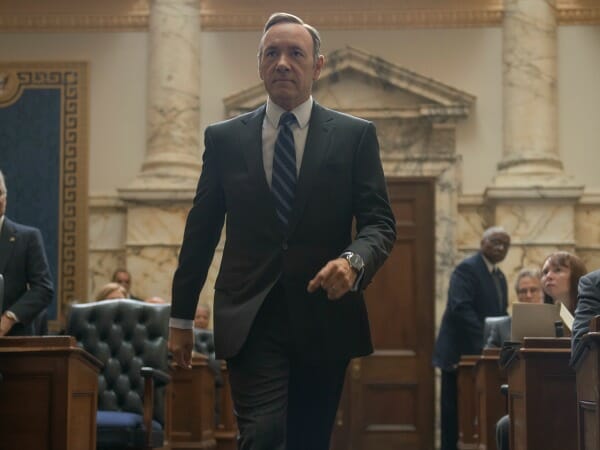
When House of Cards gets bogged down, it’s usually because the political process for passing any bill looks largely the same. It doesn’t matter whether it’s the House or the Senate; it’s still a bunch of suited men speaking to each other and arguing. Rarely, as we’ve seen, are these arguments about ethical issues or firmly held beliefs, but rather they’re about maneuvering and egos. The few people in the show who have genuine principles tend to be dispatched quickly in favor of those who are in tune with the system. It just so happens that watching the system tends to be a bit dull, and the first half of “Chapter 16” was filled with that sort of material.
Fortunately, though, the creators of House of Cards also know that each episode needs to be individualized, to have a big event beyond simply showing us that the gears are turning. In “Chapter 16” this takes the form of Frank Underwood’s dark parody of Mr. Smith Goes to Washington, in which he forces a bill through the Senate through willpower and a willingness to play dirty. The bill, as is fitting to this parody, is horrible. The fact that it’s the Republicans who refuse to sign it, despite the bill’s far-right stance, is also pretty entertaining and more than a bit horrifying. But really, it’s the way this scene answers Jimmy Stewart and Frank Capra in the most cynical terms possible that makes it play so well. Here, as in that classic movie, the political process is clearly broken. Rather than “fixing” it through passion and righteous indignation, though, it’s fixed through political maneuvering. The images of senators being carried into the hall in order to vote is certainly stirring, but not for the reason they think. The obviousness of their acting and the stupidity of this entire realm of political theater is what makes it impossible to look away. Politics in House of Cards always needs to be played to an audience—this is, after all, the only show that has literal soliloquies in the midst of scenes—and here we’re offered another example of why this part of the process is disastrous.
Another reason why “Chapter 16” was a bit of a step down from previous episodes was because of the supporting plots. One of these, showing us Rachel’s horrible life in what’s essentially prison, was particularly odd because it left us without a real conclusion or punctuation mark. She finds herself joining a church group not because of belief but because she’s looking for human contact anywhere she can get it. What this means for the rest of the show, however, is impossible to guess. I’m always more than a little surprised at how unwilling to drop Rachel as a character House of Cards continues to be. She clearly has more of a role to play, and her life is certainly miserable and an important contrast to the politicians she unfortunately involved herself with, but beyond that her story isn’t very compelling.
Lucas’ search for a superhacker wasn’t terribly engrossing either, mostly because at least for me it stretches the show’s plausibility. Presumably this is a setup (since everyone’s already aware that Lucas is searching Tor for hackers), but even so, the coincidence of this superhacker living in D.C. is more than a bit ridiculous. I’m also just not a fan of the type of cliches that this type of storyline engenders, as movies and television tend to treat hacking as if it’s some sort of strange computer magic and those who do it as technological wizards. The eventual revelation of the hacker’s den (not to mention the fact that he’s one of the McPoyles from It’s Always Sunny in Philadelphia) added a bit of interest to this search, but otherwise the implausibility just left me sighing.
“Chapter 16” certainly wasn’t a filler episode, not just because of its excellent setpiece but also because for shows with this many characters and stories, it’s necessary to have space for all the pieces to move into place. It was consequential, but mostly in secondary functions; furthering the antagonism between Tusk and Frank was necessary, as was Lucas meeting the hacker (and, presumably, Rachel joining the church group, though why exactly is difficult to fathom), but none of these were the focus, which was instead on this week’s political McGuffin. The machinations around this were a bit creaky, but then the setpieces are really to a large extent what the show’s about, and if it takes so many scenes of back of forth between the men in suits in order for us to have Frank at the podium or talking about his place in the picture, then so be it. Let’s just hope that after these last few episodes, we can go a little while without needing another piece of legislation to pass.